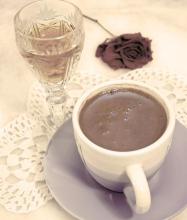Introduction to the varieties of coffee flavor and taste of Latisha Manor with rich and varied flavor
China Coffee Network
Now Antigua (Antigua) is a famous producer of coffee, rich volcanic soil, low humidity, strong sunlight and cool night breeze are the characteristics of Antigua. Three spectacular active volcanoes ── Agua, Acatenango and Fuego form a beautiful valley. Fuego active volcano also adds misty dust from time to time. Every 30 years or so, the area near Antigua is hit by a volcanic eruption, which provides more nitrogen to the already fertile land, and plenty of rainfall and sunlight make the place more suitable for growing coffee.
(beautiful scenery of volcanic eruption)
Antigua coffee is produced in Camana Manor, where the best quality coffee is ELPulcal, which is not only of good quality, but also, when compared with other Latin American coffees, this coffee is quite complete, rich and astonishing, and you will find it unexpected if you enjoy it with chocolate. The most important thing is that it has a very rich flavor and a richer taste, and it has a fascinating taste of tobacco and is known as the "most perfect coffee bean".
(coffee grower at Camana Manor)
Another old coffee estate worth mentioning in Guatemala is the Graft Manor (El Injerto) in the northwestern Vettenango region, or translated as Incht Manor. The name of the grafted manor is strange, and its name comes from the founder Aguiri. Jesus Aguirre Panama worried that the coffee seed breeding variety would change the characteristics of the original coffee variety, so he used grafting method to breed pure bourbon varieties to ensure the quality of coffee. However, at the beginning, it was proud of the purebred bourbon, but today's grafted regiment is valued by the hybrid Pacamara.
(coffee farmers pick coffee fruits by hand)
The varieties of Pacamara coffee beans cultivated by the grafted manor are planted at a high altitude of more than 1600 meters, which is as famous as the rosy summer of the Emerald Manor in Panama. Pacamara coffee with rich and varied flavor, round and smooth taste. From 2008 to 2010, he won the "extraordinary Cup" Cup test championship in Guatemala. Pacamara Champion beans, which took over the estate in 2008, sold for $80.20 per pound, causing a stir in the coffee world, the Antigua Valley, the oldest and best-known coffee producing region in Guatemala. Volcanoes and extremely shallow groundwater levels form a dry microclimate, characterized by low humidity, adequate sunshine and cool nights.
Antigua is a closed valley surrounded by three volcanoes: Agua, Acatenango and Fuego. Antigua is flat and slightly sloping, unlike other coffee producers located in volcanic areas.
Most coffee trees are planted in the hinterland of the valley, but even so, they have reached an altitude of 5000 feet; in addition, some farmers grow coffee on the slopes of volcanoes, nearly 5600 feet above sea level.
The extremely high content of pumice (pumice) in the soil of Antigua (from the active Fuaigo volcano Fuego) keeps the humidity stable at 65% all the year round, which is very different from other volcanic coffee producing areas, where the humidity usually varies greatly between the dry and wet seasons.
Fertile volcanic soil, low humidity, plenty of sunshine and cool nights all make Antigua unique.
The three majestic volcanoes Agua, Acatenango and Fuego surround the Antigua Valley. Every once in a while, Fuego-- one of Guatemala's three active volcanoes adds fresh, mineral-rich ash to the soil of Antigua. The volcanic pumice in the soil can keep the soil moist, greatly making up for the lack of precipitation in Antigua, which is the least rainy of the eight coffee-producing regions in Guatemala.
Like all Guatemalan boutique coffee, Antigua coffee is grown in shade. In Antigua, shade is mainly used to protect coffee trees from frost, which is cold and sometimes frosty from December to February every year. Dense shade and extremely shallow aquifers work together to create a unique micro-climate for the coffee trees living in it.

Important Notice :
前街咖啡 FrontStreet Coffee has moved to new addredd:
FrontStreet Coffee Address: 315,Donghua East Road,GuangZhou
Tel:020 38364473
- Prev

Introduction to the varieties of Fuyin Manor coffee with unique flavor and mellow taste.
This is the natural fermentation method that was once scoffed by Americans. It is said that when Americans heard of such a way of making coffee, it was regarded as a fantasy. It was not until it was reported by National Geographic magazine that they became interested in it. Coffee bean screening: this digestion process, so that coffee beans have an unparalleled magic change, the flavor tends to be unique, taste
- Next

Introduction to the taste of coffee flavor producing area of Incht Manor with high alcohol thickness
Coffee cultivation at Incht Manor began in 1900. With a total area of 720 hectares, it maintains 470 hectares of primeval forest in order to maintain the natural and precious microclimate. To prevent the microclimate of the whole manor from being affected by excessive reclamation. The use of reasonable farming methods to protect soil nutrients, so that soil quality will not be gradually degraded by long-term planting, so as to maintain abundance.
Related
- Does Rose Summer choose Blue, Green or Red? Detailed explanation of Rose Summer Coffee plots and Classification in Panamanian Jade Manor
- What is the difference between the origin, producing area, processing plant, cooperative and manor of coffee beans?
- How fine does the espresso powder fit? how to grind the espresso?
- Sca coffee roasting degree color card coffee roasting degree 8 roasting color values what do you mean?
- The practice of lattes: how to make lattes at home
- Introduction to Indonesian Fine Coffee beans-- Java Coffee producing area of Indonesian Arabica Coffee
- How much will the flavor of light and medium roasted rose summer be expressed? What baking level is rose summer suitable for?
- Introduction to the characteristics of washing, sun-drying or wet-planing coffee commonly used in Mantenin, Indonesia
- Price characteristics of Arabica Coffee Bean Starbucks introduction to Manning Coffee Bean Taste producing area Variety Manor
- What is the authentic Yega flavor? What are the flavor characteristics of the really excellent Yejasuffi coffee beans?

